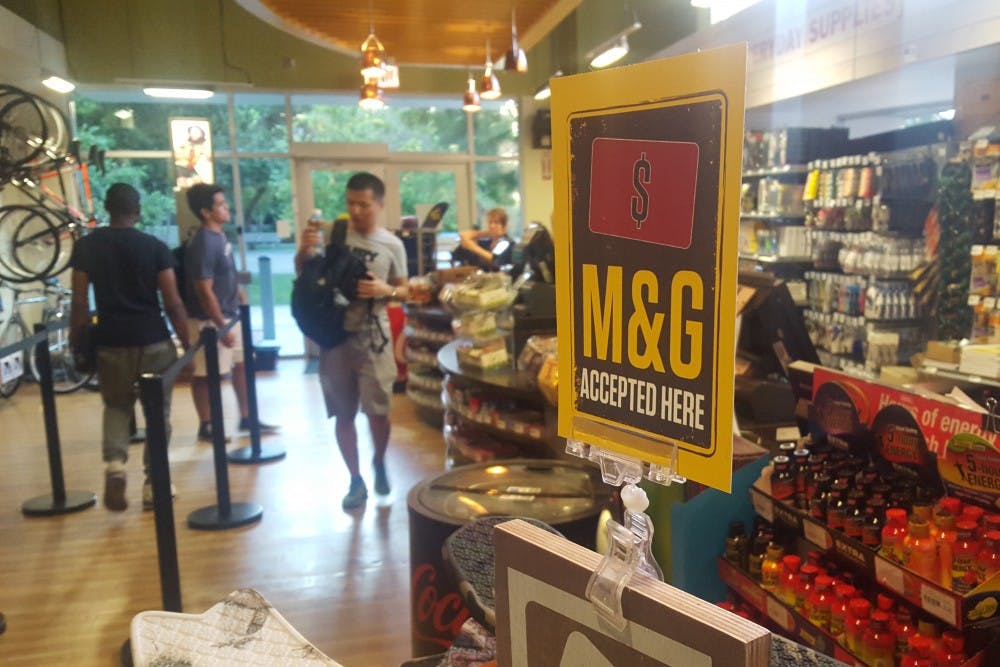My spending habits with Maroon and Gold dollars at campus eateries over the last few months have been quite interesting. When it comes to swiping my SunCard, I am a full-fledged socialist.
It began first semester when I purchased a meal plan — it came with $400 Maroon and Gold dollars per semester. Since I didn’t buy the Maroon and Gold dollars separately from my meal plan, I didn't pay much attention my balance, and now I still have some left. Apparently, the same thing happened to some close friends of mine. So we have become what everyone would become in our situation: collectivists.
Life has been fantastic. Last week my friend paid for my dinner at the M.U. once, and another friend has bought my snacks at the P.O.D. (“Provisions on Demand” campus mini-mart) three times in the last seven days. The other day I was in line behind a woman I didn’t know, and, when I saw she was only buying a protein bar, I offered to cover her purchase with my Maroon and Gold dollars. On top of that, I have taken a friend to the P.O.D. and covered the cost a couple of times each week for the last two months.
Just like that my life is more convenient, and I’m a charitable guy. At this point, my friends and I simply cover each other’s purchases for the heck of it. When we visit the P.O.D. we buy things as a community, and it works well.
It seems obvious, then, that we should do the same thing as a nation.
Unfortunately, socialism cannot work like that with real dollars. It would take far more than an article to weigh the pros and cons of socialism, but here I will focus on the main problems that Maroon and Gold dollars bring to light: Currency loses its value and is spent imprudently. Remembering some reasons why socialism is harmful is important today — millions of Americans view it positively:
My Maroon and Gold dollars are worth less than half of what the cash in my wallet is worth. Last week, I bought a 60-ounce bottle of juice for $10 and a lunch from Qdoba for more than $10. Usually, I wouldn’t even spend half that on either of those items. Earlier this year, I paid $40 for a pair of Sony earphones that I found for less than half the price on Amazon the next day. Every single item in the P.O.D. is marked up, and it should be. We pay the inflated prices that the P.O.D. asks for, thereby condoning those markups.
The interesting bit, though, is about why we continue to pay inflated prices.
Maroon and Gold dollars do not represent work the same way that cash in our wallets does. Before I spend $15 from my debit account, I picture an hour of hard labor on a roof in the sun, and then I consider whether I want to spend $15. When I spend 15 Maroon and Gold dollars, I have no tangible representation of what they mean. They were tacked onto my meal plan, and I didn’t purchase them dollar-to-dollar with real money, so I spend them with few reservations. Furthermore, my friends and I pool our Maroon and Gold dollars together.
In a socialist regime, this is problematic. There is absolutely no way that anyone can understand exactly what a dollar is worth to a person without being the person that earned that dollar. A socialist government, then, cannot be expected to be as fiscally responsible with money as the people who spend time and effort to make it.
In other words, the further removed that a person is from the actual production of a dollar, the harder it will be for that person to spend it adequately. It makes sense, then, that my friends and I are much more frugal with the cash in our wallets than we are with the Maroon and Gold dollars that came with a meal plan.
This is one of many reasons why the U.S. operates as a free-market economy, and one of many reasons why we should continue to do so. Another issue stems from fiscal irresponsibility: Everyone suffers when money is overspent. It may be easy, and true, to say, “The guy writing this and a few of his friends might be dumb enough to waste Maroon and Gold dollars, but that doesn’t mean I have to do the same.” Well, it does mean that stores and businesses can survive with high prices thanks to my friends and I, and that affects every member of the economy who shops at those places.
It’s fair to say that we spend Maroon and Gold Dollars the way we do because our only option is to spend it at the P.O.D. and at the M.U. There is no easy way for us as students to change the supply monopoly the P.O.D. has, and it would be hard to demand lower prices — we have little to no leverage, because most Maroon and Gold dollars come from meal plans. But this piece is not a rebellion against the ASU currency market. This piece is a reminder of an important quality of the free market and of private, individual ownership over currency and spending: People are best at spending their own money, not other people’s.
Reach the columnist at gheiler@asu.edu or follow @heilergeorge on Twitter.
Editor’s note: The opinions presented in this column are the author’s and do not imply any endorsement from The State Press or its editors.
Want to join the conversation? Send an email to opiniondesk.statepress@gmail.com. Keep letters under 300 words and be sure to include your university affiliation. Anonymity will not be granted.
Like The State Press on Facebook and follow @statepress on Twitter.




